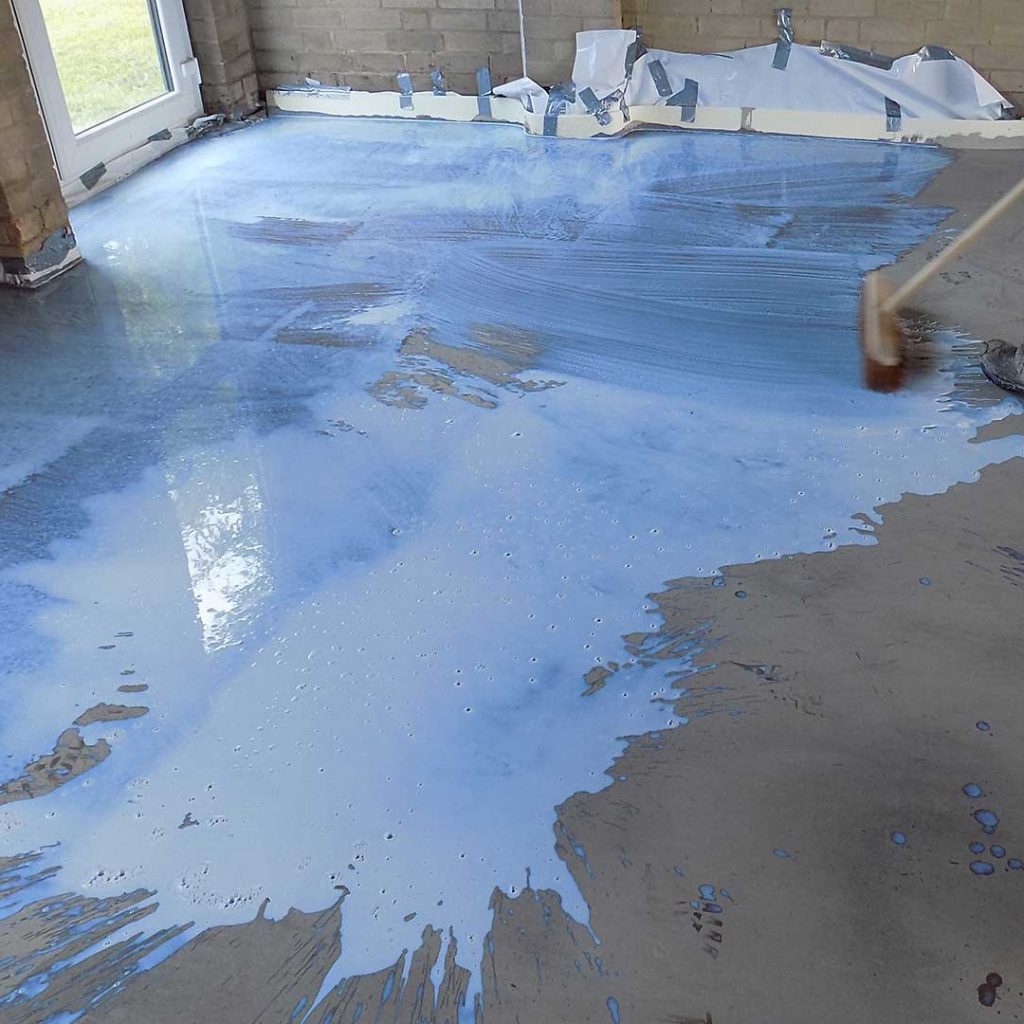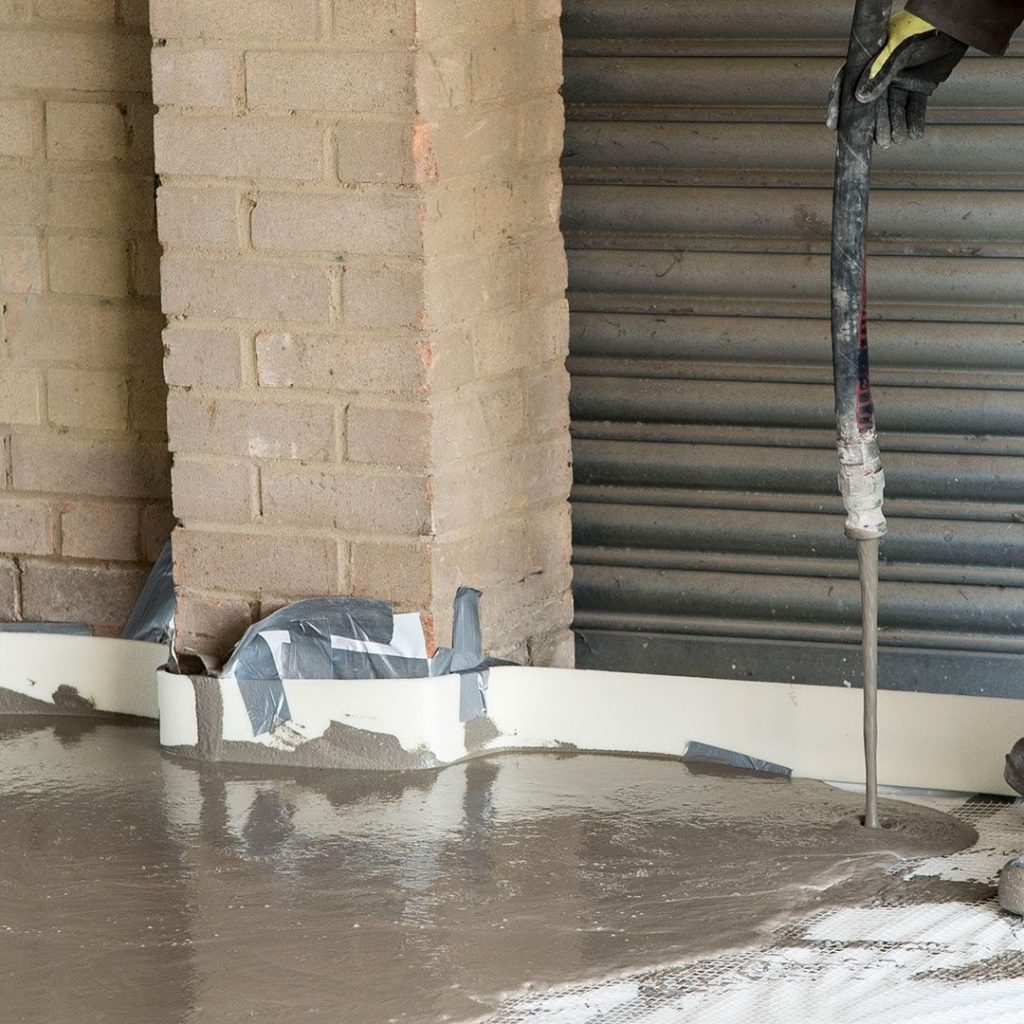
Garage flooring: how to install and repair – a Saint-Gobain Weber article
For those looking to install a new garage floor or repair an old one, Saint-Gobain Weber’s guide of hints and tips on how best to do it will be invaluable.
Whether it’s for a new build or a renovation, laying a garage floor is not as hard as people think, say Saint-Gobain Weber.
Floor screeds help keep floors level and are ideal for creating a solid base for the garage; during any kind of home refurbishment or development, one of the most important stages of laying a new floor is the application of an appropriate floor screed.
As the final layer before a finish is applied – or if it’s left without one – it’s important to get the application right first time, otherwise a poorly completed job could end up costing more in repairs in the long run.
Repair any damaged areas
If the current garage floor is damaged with holes, cracks or broken patches that are larger than 20mm in depth and less than 2 meters wide, fill them with an application of weberfloor base rapid 4360 screed.
This should be allowed to harden and then primed, before the application of the final floor screed. If there are any irregularities in the substrate under 20mm in depth, fill them with the same floor screed used to lay the garage floor.

Preparation is key
Before laying the floor make sure the substrate is clean, free from dust, grease, oil deposits or other impurities that might prevent adhesion – this may mean undertaking some sand/grit blasting.
It is advised that a primer such as weberfloor 4716 primer is applied to the substrate to improve the flow and adhesion of all cementitious and hemi-hydrate floor screeds.
Using a long-handled yard brush, it requires two coats spread in opposite directions, with 3 – 5 hours allowed in normal conditions for drying in-between coats.

Laying the floor
Start by laying a perimeter foam measuring at least 6mm. Then position two or three 15mm battens (depending on the width of the garage) on the substrate running in the direction planned on laying the screed.
Starting at the wall furthest away from the door completing sections of about 600mm at a time, layer weberfloor industry pro top 4610 – a premium self-smoothing industrial floor screed which can be applied by pump or hand – up to the level of the top of the battens. Continue across the floor until the whole area is covered.
Straight after application use a spiked roller to remove air bubbles. Do not revisit the screed with the roller after initial pouring as this could result in marks being left in the floor.
Light foot traffic is possible after 2 – 4 hours in normal conditions. After 24 hours, it will be ready to drive and park a car on.
The Saint-Gobain Weber website for How-to Guides can be found by clicking the link.
Saint-Gobain Weber
Dickens House, Enterprise Way
Maulden Road
Flitwick
Bedford
MK45 5BY
UK
Visit Saint-Gobain Weber's website
Visit Supplier's page
Latest news

29th April 2025
Senior pledges to ‘bee’ part of the solution with new biodiversity initiative
Senior Architectural Systems has installed its first on-site beehive, marking another step forward in its commitment to sustainability and biodiversity.
Posted in Articles, Building Industry News, Building Products & Structures, Building Services, Curtain Walling, Doors, Glass, Glazing, Innovations & New Products, news, Restoration & Refurbishment, Retrofit & Renovation, Sustainability & Energy Efficiency, Walls, Windows
29th April 2025
West Fraser range delivering key benefits for South-East carpentry company
An experienced carpenter and building site manager who has recently set up his own company is using high performance panel products from the West Fraser range.
Posted in Articles, Building Industry News, Building Products & Structures, Building Systems, Case Studies, Garden, Restoration & Refurbishment, Retrofit & Renovation, Sustainability & Energy Efficiency, Timber Buildings and Timber Products
29th April 2025
CPD Courses Available Online From Ecological Building Systems
Ecological Building Systems, a leading supplier of natural building products for sustainable construction, has revealed its comprehensive CPD programme for the year ahead.
Posted in Articles, Building Industry Events, Building Industry News, Building Products & Structures, Building Services, Continuing Professional Development (CPD's), Information Technology, Innovations & New Products, Insulation, Restoration & Refurbishment, Retrofit & Renovation, Seminars, Sustainability & Energy Efficiency, Training, Walls, Waste Management & Recycling
29th April 2025
WindowBASE launches new prospect databases at FIT Show
Visit WindowBASE at the FIT Show to see first-hand how it helps companies find new customers – the company is launching an easy-to-use, intuitive platform on Stand G16 at the NEC Birmingham from 29th April – 1st May.
Posted in Articles, Building Industry Events, Building Industry News, Building Products & Structures, Building Services, Doors, Exhibitions and Conferences, Glass, Glazing, Information Technology, Innovations & New Products, Posts, Publications, Research & Materials Testing, Restoration & Refurbishment, Retrofit & Renovation, Windows
 Sign up:
Sign up: